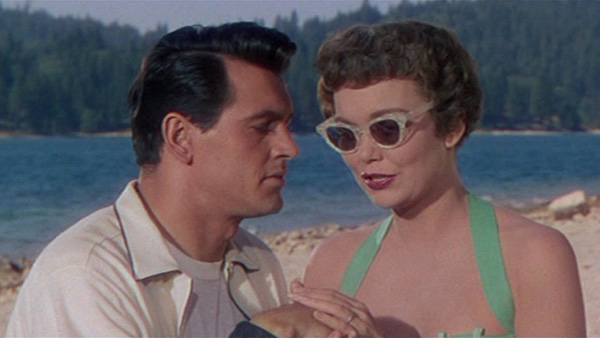
second chances:
DOUGLAS SiRK
c.a. funderburg
Despite their sterling reputations, some films and filmmakers just don’t do it for us here at The Pink Smoke. This series, Second Chances, explores our attempts to grasp greatness where we’ve previously failed to find it; to actively make an effort to appreciate esteemed artworks for which we currently have an antipathy.
We’ll give cult favorites like Escape From New York another shot and dig deep into the filmographies of beloved auteurs whose appeal eludes us (like Federico Fellini or Nicholas Ray.) With a little luck, maybe we’ll even come out at the other end of the process as newly-minted fans…
{the SECOND CHANCES index}
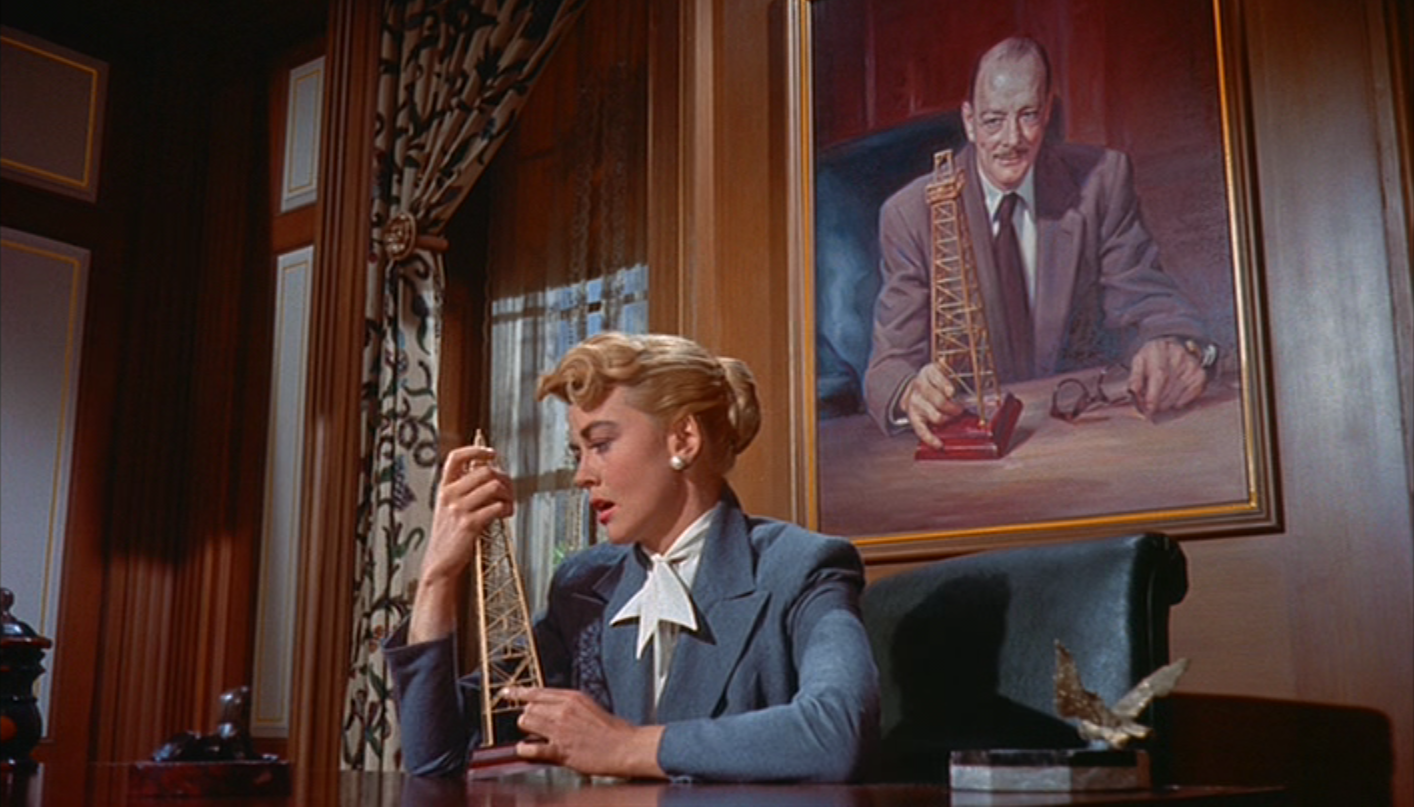
INiTiAL RESiSTANCE:
Written on the Wind, the story of an odious playboy played by Rock Hudson and the various romantic entanglements of a repugnant clan of wealthy assholes, was the first film by Douglas Sirk I ever saw. It usually gets compared to a soap opera because it pants after a collision of peccadillos amongst sexually insatiable scheming sluts, impossibly handsome untameable bad boys, wet-eyed blue-collar hunks, merciless oil magnates, ranchers, drunks and jerks of an extremely limited variety. It’s an obvious precursor to Dallas or Dynasty but the idea amongst aficionados is that there’s something going on beneath the patently moronic surface here, folks!
But I’m not sure how deep those secret depths even run: when trampish Dorothy Malone longingly strokes a model oil derrick while lusting after Rock, it’s clearly a coded message about jerkin’ a ding-dong, but it ain’t that fucking much of hidden meaning beyond a crude joke that only the most juvenile of 1956 audiences might’ve been hip to. Getting that joke here in the new century requires zero hipness and it’s impossible to say what the payoff might be nowadays to catching that drift, other than a chance to look back and chuckle at all the squares seven goddamned decades ago who didn’t get such an obvious gag.
I’ve always had an aversion to camp; later in life that aversion has now metastasized into outright contempt. By its nature, camp is self-congratulatory (I got the joke) and condescending (there are others who did not, sometimes including the filmmakers themselves.) I’m always going to identify with the dumb one, with the poor schmo being condescended to, with the hapless filmmaker who fucked up his movie and made something all the smart and self-satisfied ones want to laugh at: I identify with the object being pointed at and ridiculed by those in a closed circle, never the group that gleefully celebrates together in ridicule and humiliation.
Of course, those groups frequently believe they’re celebrating their own smartness rather than attacking anybody - but culturally, I have no use for the legions of people trained like dogs by film school to believe they deserve a treat for doing the homework of solving a film’s equations. Students love “cracking the code” - it makes them feel like they’ve achieved concrete goals and therefore have earned praise (even if the process is only self-congratulatory and entirely subliminal.) It’s an automaton’s dead-eyed approach to art: a concrete “hidden” message that can be “interpreted” by an audience who has “studied” history/culture/art and therefore has engaged in an action with concrete and verifiable utility and purpose. Here’s a biscuit.
It’s the basest and most grotesque “yay, I got the right answer, give me a good grade!” approach to art, an approach that’s entirely infected the worthless academic culture around cinema and threatens to swallow even critical writing. It is dumb made to feel smart, empty-headed made to feel full of brains, middlebrow made to believe it is underground, conformism made to believe it is radicalism.
There’s nothing behind this mechanized version of “understanding:” in a pre-scripted call-and-response, it offers a “knowing” laugh aimed down at audiences of the past who weren’t in on the joke - for example, the moment in Written on the Wind when closeted Rock Hudson evinces a coded lack of familiarity with vaginas and the sexual satisfaction of women. Undoubtedly decades ago, engaging that kind of codification was a meaningful activity, especially amongst the gay communities that relied on codified pop culture to connect and interact with each other without risking their damn lives. But every radical activity eventually ossifies and after ossification it can be co-opted.
Most, if not all, of the films I have seen by Douglas Sirk rely to some extent on camp codification for their meaning: as artworks, stuff like There’s Always Tomorrow, Interlude and Written on the Wind are artificial and absurd. In terms of content, of plot and performance and stylization, they are nearly indistinguishable from soap operas. They’re probably more handsomely mounted than those t.v. shows, definitely more delicately lit, but the plain framing and editing, the overbearing scores, the ridiculous characters and stories, are de rigueur for the genre. The insult of “melodramatic nonsense” is perfectly applied to these melodramas, melodramas which in no small part helped define what is meant by the insult.
More than any filmmaker, Sirk is a filmmaker that new audiences experiencing his movies in modern era work to convince themselves is great. I saw a half dozen or so of his movies and entirely wrote him off. It felt more respectful than shaking my own hand for “getting” them.
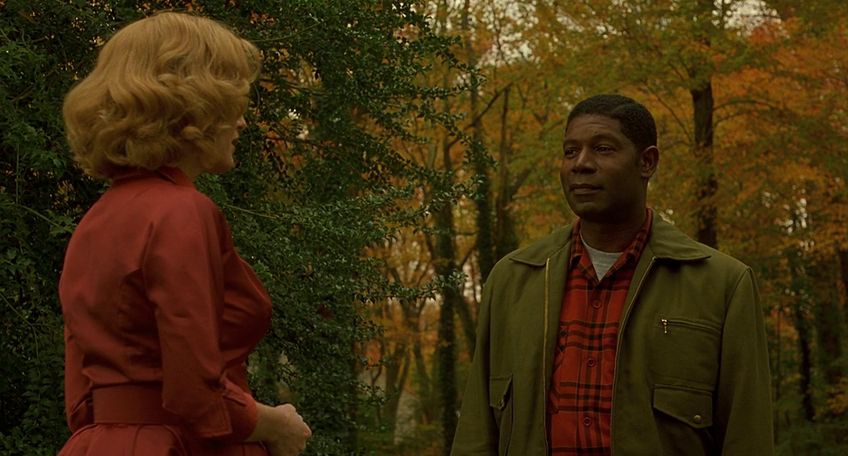
REASONiNGS FOR REASSESSMENTS:
Fassbinder and Haynes. Two of my favorite filmmakers adore Sirk. Rainer Werner Fassbinder and Todd Haynes have done more than anyone to keep the cult of Sirk alive, their imitations of his life’s work rising above glancing homage. Without question, many of Haynes and Fassbinder’s most esteemed films are directly and pointedly influenced by Sirk. Carol and Far From Heaven hew so much from All That Heaven Allows that it’s literally impossible to conceive of their existence without Sirk’s film - they are pastiches in the purest sense of the word.
For Haynes, whose work can be deliriously free-wheeling, imaginative, and unruly, Sirk seems to represent the possibility of radicalism in artistic modesty. By more or less combining Imitation of Life and All That Heaven Allows into a single film (Far from Heaven) he found a conduit through which he could touch on not only the deceptively oppressive normative structures of society but also the live wire of race, a subject his films otherwise generally eschew. In some respects, Haynes has an incredibly narrow focus as an artist and it’s exciting to see him explore “constriction as freedom” via Sirkian tactics (i.e. the potential of limiting his aesthetic scope as a method of expanding his moral panorama.)
I’m not gonna bullshit ya, though - I adore the Haynes of Poison and Superstar: The Karen Carpenter Story. My enthusiasm for Far From Heaven and Carol is fairly muted, so the opportunity to expand my relationship with Haynes’ work through a greater appreciation of Sirk is appealing. What if this piece also becomes a de facto “Second Chances: Far From Heaven” piece as well! That would be pretty sweet, in my opinion. But that’s only an opinion.
Fassbinder’s Sirkian melodramas are less of an imitation of Sirk’s aesthetic than Haynes’ films (of Sirk’s signature lighting and production design) but no less decisively in debt to their master. In 1971, a retrospective of Sirk’s work was mounted in Berlin and seeing the films in that program had an immediate transformative effect on Fassbinder’s movies. Before becoming versed in Sirk, Fassbinder’s films were either raw theatrical pieces like Katzelmacher and Gods of the Plague, deconstructionist genre pieces like Love is Colder than Death and Whity or lumpy experimental pieces that struggled to find a form like The Niklashausen Journey.
There’s an immediate shift in his style with 1972's The Merchant of Four Seasons, his first true masterpiece and one of his absolute greatest films. It’s followed immediately thereafter by The Bitter Tears of Petra von Kant (also 1972) and Ali: Fear Eats the Soul (1974), two more of his signature films, both deeply in debt to Sirk. His February 1971 essay on Sirk, a brief overview followed by his thoughts on six films, laid out his relationship to the German-Danish expatriate turned Hollywood prestige film director.
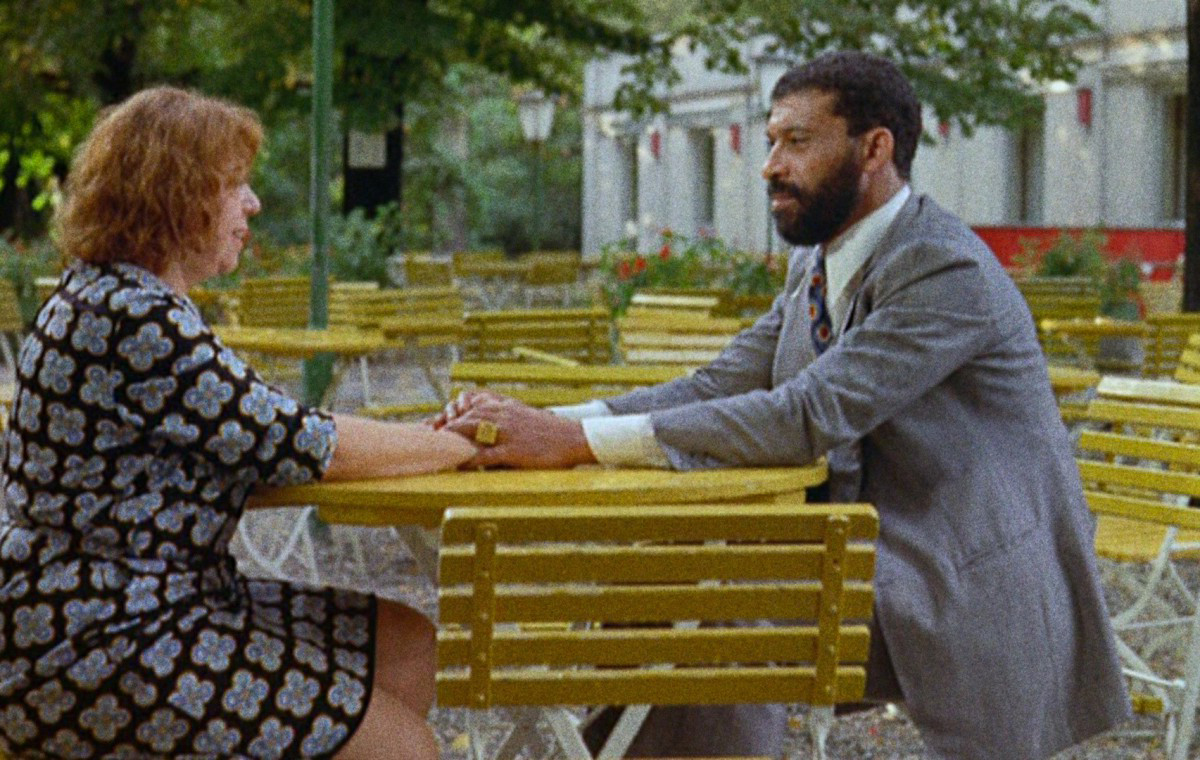
Fassbinder’s essay is as close to a mission statement on his intent as you will find. His theoretical writing has a tendency to be tinged with cynicism and defeatism - he writes like a revolutionary who doesn’t believe revolution is possible. He sees irony too clearly, is too much of a natural contrarian to express his emotions unabashedly in his writing about his own deeply political work. Any time he gives his thoughts on the world and the meaning of his own art, he tempers those thoughts with hard-edged analysis and irony. But with Sirk, he writes as an acolyte - as an essayist, he is never more romantic than in his piece on Sirk. It reads like a revelation, a glimpse of Fassbinder’s secret beliefs, of the hidden recesses of a heart that he will not let rule him.
But strangely, this essay is no less harsh, no less analytical and unforgiving, for being romantic - that’s how it captures the spirit of his films more than his own writings on his artistic intent, how it provides a key for unlocking his films: it's the essay that most resembles his cinema. Forget his other writing and interviews, read his piece on Sirk and watch his films and you will know all there is to know about Fassbinder.
For Fassbinder, Sirk is an articulation of the antagonistic, doomed relationship between the emotional and the political - Sirk’s melodramas understand mores as a framework for mediating oppressive and destructive emotions, a pacifying framework that in turn warps and cripples our thoughts and feelings. Sirk helps Fassbinder understand love as a political act - not “love” purely in a positive meaning, but as a destructive and possessive force that is simultaneously sympathetic and heart-rending.
His thoughts on Imitation of Life are the most revealing: a strand of its plot concerns a black mother’s failure to comprehend her mixed race daughter’s desire to pass as white. Here he is on a scene concerning what should be a deathbed reconciliation between the mother (Annie) and the daughter (Sarah Jane): “Her love still prevents her from understanding. It seems to her to be a sin that Sarah Jane should want to be taken for white. The most terrible thing about this scene is that the more Sarah Jane is mean and cruel the more her mother is poor and pathetic. But in actual fact, exactly the reverse is true. It is the mother who is brutal, wanting to possess her child because she loves her.”
Fassbinder’s great insight as an artist is that love is rarely a liberating force and that the structures designed to mediate love’s impact are necessary - but simultaneously, he explores how any societal structure has the capacity to be oppressive. He finds an unbelievable phrase to describe the mother’s love in Imitation of Life; he says Sarah Jane “defends herself against her mother’s terrorism, against the terrorism of the world.”*
Fassbinder’s films that most directly imitate Sirk (Ali: Fear Eats the Soul, Marriage of Maria Braun, The Merchant of Four Seasons) have a tendency to be his most tender and humane. He is a filmmaker who rarely surrenders his sympathy for humanity but is nevertheless capable of an incredible cruelty: his is the cruelty of honesty. But his Sirk-inspired films mute the cruelty without sacrificing the honesty.
Fassbinder once more on the deathbed scene in Imitation of Life: “The cruelty is that we can understand them both, both are right and no one will be able to help them. Unless we change the world. At this point all of us in the cinema cried. Because changing the world is so difficult.” Look, I mean… I need to see these films and give Sirk another chance, right? Just look at that quote! I’d have to be a monster to not look deep into my heart and try to see what Fassbinder has seen in Sirk. I like to think I'm not that much of a monster, anyway - but who knows? I’m not a monsterologist.
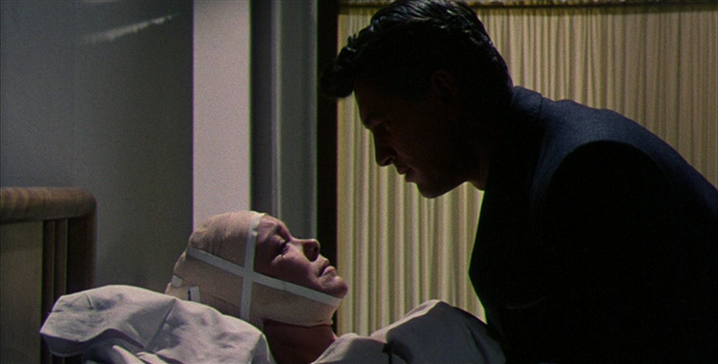
MAGNiFiCENT OBSESSiON
douglas sirk, 1954.
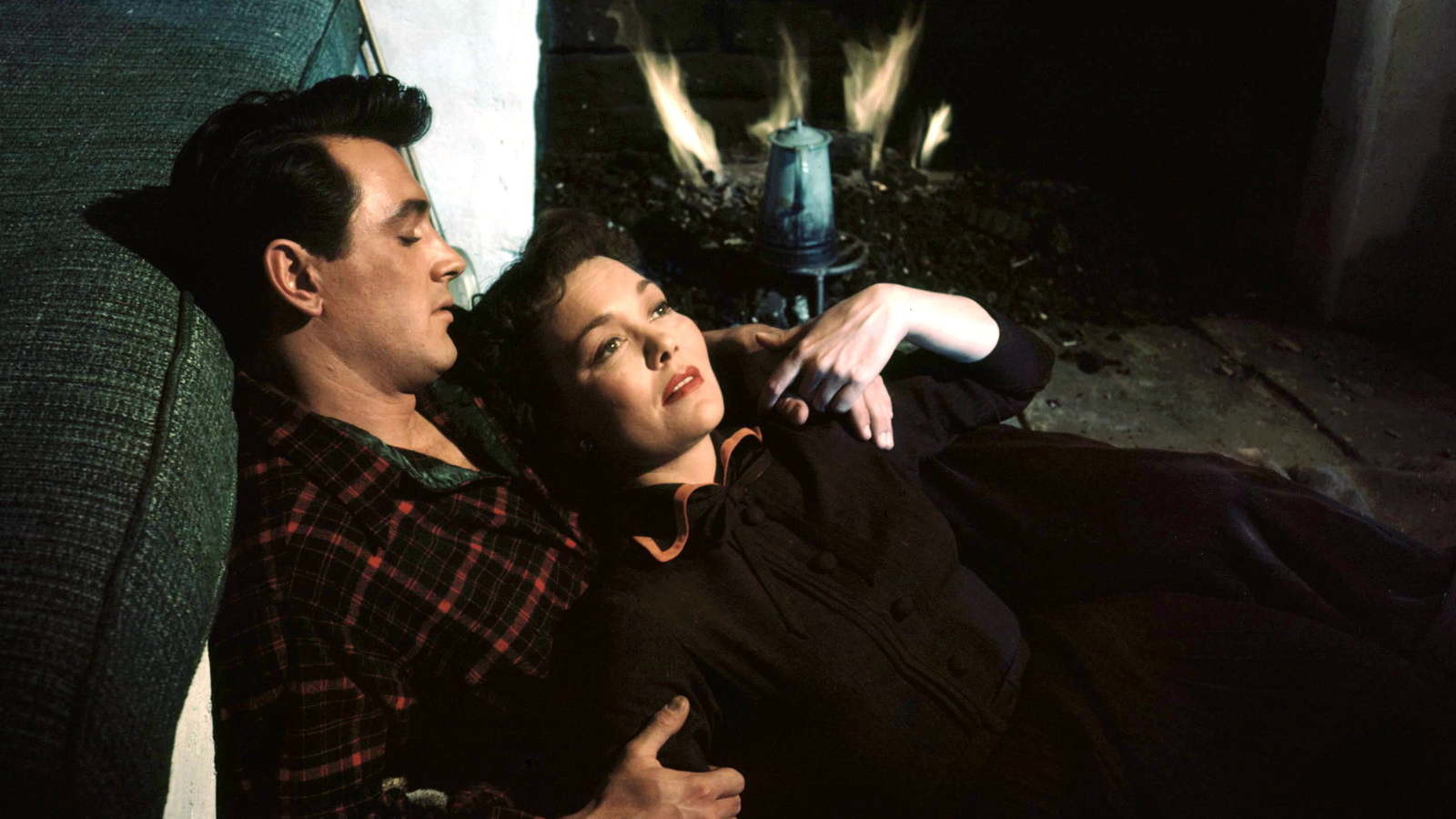
ALL THAT HEAVEN ALLOWS
douglas sirk, 1955.
I decided to re-enter the world of Sirk by watching one of his films I had never seen before and one that I had liked. I started with the magnificently titled Magnificent Obsession (if nothing else, Sirk’s films have amazing titles) and then it was a toss-up between All That Heaven Allows and Imitation of Life for the second half of the double feature - I hadn’t gone crazy for either one the first time around, but I remembered both as being a cut above junk like Written on the Wind and The Tarnished Angels.** I settled on All That Heaven Allows, Sirk’s 1955 re-teaming of the stars of 1954’s Magnificent Obsession (Jane Wyman and Sirk’s go-to big ol’ hunk of man, Rock Hudson.)
Although they were made only a year apart, Sirk had three films released in the interim. Regardless, Obsession and Heaven are the collective moment when Sirk decisively discovers his style - he was a journeyman who made almost 40 features and this duo of titles is moment when he really became "Douglas Sirk." When people talk about Sirk, they don’t mean the director of Mystery Submarine and Lured, but the maker of delicate Technicolor melodramas (and a few strikingly luscious B&W ones.) He really only settles into his True Style after Heaven (with its immediate precursor Obsession being I think the earliest fully-formed example of what’s meant by Sirkian.)
All of his canonized classics come in the late 50’s in the wake this pair of films: Written on the Wind, Interlude, Tarnished Angels, A Time to Love and a Time to Die and Imitation of Life. Before Obsession, he tended to make lighter, more playful if not overtly funny comedies, colorful costume dramas and movies that stand at the edge of any given genre without diving in completely. Midway through writing this piece I realized that I had actually seen 1953’s All I Desire and it’s so different from his signature style that it hadn’t even registered to me as Sirk’s work. Of course, it stars the peerless Barbara Stanwyck and her vibrancy would never be constrained by the archness and artificiality intrinsic to Sirk’s style - her liveliness as an actor is completely at odds with the plasticity of form Sirk orchestrated in his most well-known films.
So figured I would try to catch him at the moment he became himself, a moment somewhere between Magnificent Obsession and All that Heaven Allows.
It did not get off to a promising start. The massive problem with Magnificent Obsession is its predictability. There is almost nothing in this film that happens as a surprise, almost nothing in it that is not entirely predictable from the first scene. It's lifeless. The artificiality of Sirk's films is part of the show - critic-wise, the falseness of Sirk's work is intrinsic to what people like about it. But I think there's a distinction that's interesting: the manufactured, unreal qualities of the performances, lighting, costumes, dialog, music & production design aren't actually what make Obsession feel so exhausted and exhausting, it's the stillborn plotting. The flatness of the film isn't achieved by any of its plastic aesthetic qualities, only its narrative qualities.
Bad boy millionaire playboy Rock Hudson is an insensitive motor-boat racing galoot: his speed-boat accident (caused by a vain disregard for safety!) circuitously leads to the death of well-respected physician who lives on the opposite side of the lake from where the accident occurred. During his recovery, Rock mentions that he had been attending medical school but gave it up for a life of frivolity - I wonder how that tidbit will relate to the physician’s widow, now blind after a second goddamned accident caused by Rock.
The second accident, when Wyman flees an aggressively contrite Rock out of a taxi cab and into oncoming traffic, might be the film’s only surprise - certainly, for me it was the film’s biggest laugh-out-loud moment. When I draw Magnificent Obsession in my mind, I envision a pile of contrivances, a teetering mass of tragedy piled on deception piled on changes of heart piled romantic revelation piled on, piled on, piled on. But there’s base foreseeability to it all, it’s as spontaneous and lively as a retirement home sing-along.
There’s no denying the contrivance and obviousness of this film. If you like this movie, it’s because in your heart you have accepted its absurdity. The title comes from the deceased physician’s secret nobility, his magnificent obsession with do-gooderism. It’s kinda like The Secret: somehow by anonymously doing good for others, you will be able to manifest your own life’s True Meaning. This is all explained to Rock by an artist who was taught the secret by the tragically dead doctor - a tragedy like any of them in the film: a formality that exists only to maneuver the story. But this artist, who was never much of a painter until he discovered the big secret, gravely tells Rock that this Secret Wisdom comes with a caveat: watch out, once you get started doing good, you’ll become obsessed it. It will be a magnificent obsession.
Don’t worry, the line gets repeated over and over throughout the movie. Oh, what a magnificent obsession it will be.
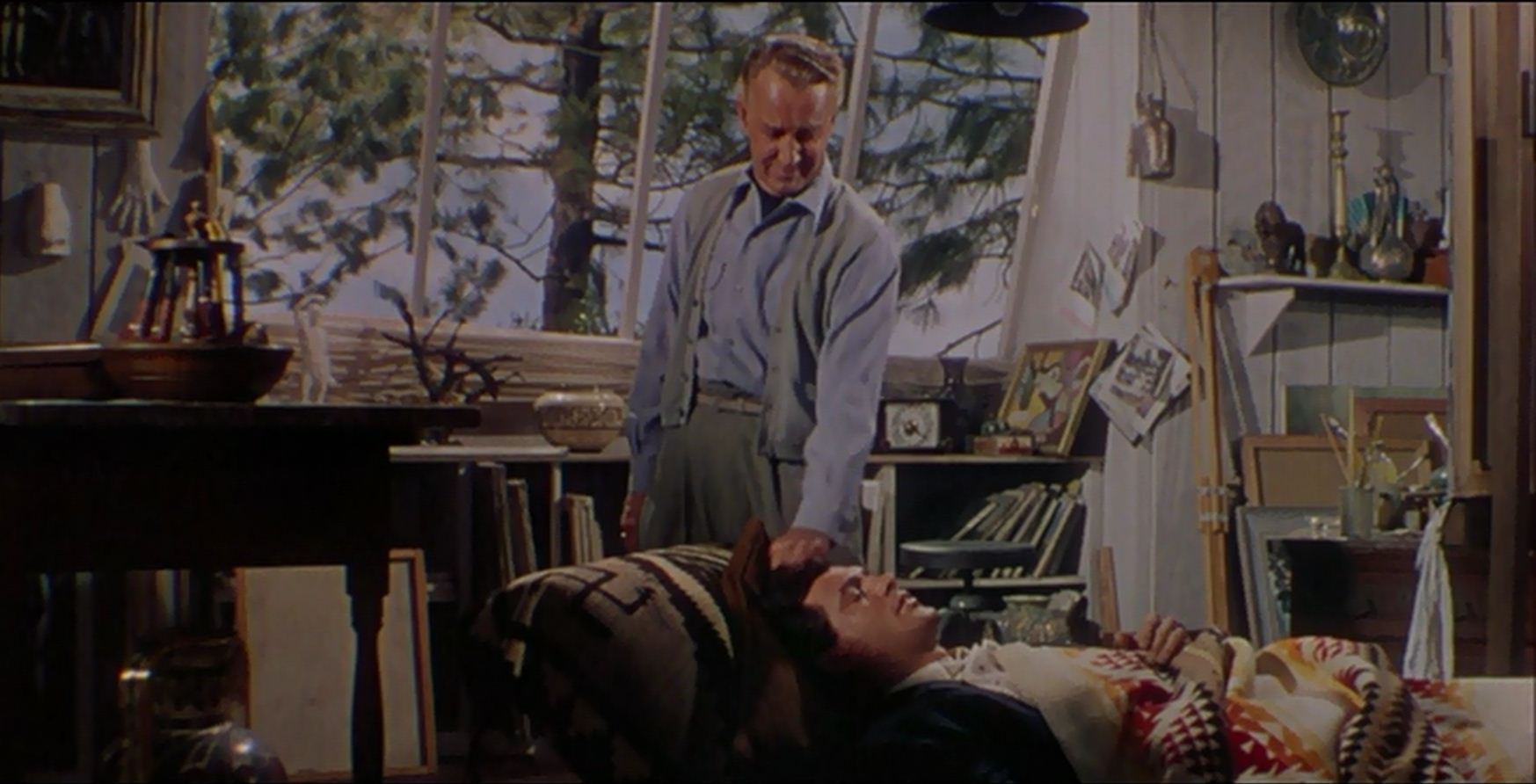
The dialog is a disaster - nearly every line is exposition; characters don’t have conversations so much as tell each other precisely what they need to know to keep the plot well-organized and fully in motion. The writing becomes so bad that it begins to feel like a put-on, that Top Industry Professionals capable of mounting such a handsome and expert production must be aware of how insanely shitty the writing is. There’s no way it could be this bad by accident. The outlandishly over-bearing score gives you same eerie feeling, the unsettling feeling caused by experiencing its slick orchestral professionalism in service of sheer idiocy.
This is the nefarious edge of the blade of intentional camp: so bad it is good, but on purpose. Badness as goodness. Split down the middle along a razor’s sharpness, with quality on one side and crap on the other. There is an undeniable laughableness to this film’s insane sincerity. The plot is shamelessly contrived in its determination to reach its predestined end and concerns for realism are nonexistent. It’s a film where characters give away all of their money and worldly possessions as part of their covert program of righteous Christ-like selflessness but continue living carefree in palatial lakeside estates and taking sweepingly romantic European vacations. I say this without hyperbole: few films are as divorced from recognizable reality. There’s a fundamental artificiality to its emotional landscapes - astroturfed sentimentality.
This is where I become unsure what those who love Sirk intend for me to take from his movies. In the context of Sirk, “arch,” “artificial” and “contrived” become complements. That Magnificent Obsession is crushingly boring for its terrible dialog and feeble-minded predictability is somehow not to be taken as a strike against it. This is a hard film to sit through and its crypto-Christian self-help message is its only point of interest: its cultish vision of self-abnegation as method for the metaphysical manifestation of personal fulfillment. Its ideas about sacrifice are weird and disingenuous like only apostasies that flatter the desires of believers can be.
The garbage it’s selling is the hoariest Hollywood snake-oil: a millionaire bad boy who can only be tamed by a good-hearted woman, a speed-boat-racing hunk who could be the world’s greatest doctor if only a handsome and modest woman gave him the reason to do so. It’s shameless fantasyland wish-fulfillment from every angle and it’s impossible to believe Fassbinder or Haynes were influenced by it. This is not a film that is meaningfully different from the equally slick and pandering 50 Shades of Grey. I watched Obsession before Heaven and all I could think was “I just. do. not. fucking. get. it.”
Maybe my frustrations with Obsession made me go easy on Heaven, but for whatever reason I instantly found it to be immensely more likable. As I mentioned, it reunites Hudson and Wyman after the success of their previous pairing. But from their first interaction, something is different. Obsession is a remarkably sexless affair - when Hudson and Wyamn kiss, it resembles nothing but a closeted gay man kissing a handsome middle-aged woman whose star appeal is based on her unthreatening modesty and ability to get greying housewives to identify with her. Their chemistry is purely theoretical - appropriate for a movie with only a theoretical resemblance to the human experience.
But in Heaven, she gives him the look. They’re on the front lawn of her elegant suburban home. Once again, she’s a widow. Hudson is her tree maintenance man, sensitive and rugged in his every gesture. They speak briefly about his plans for the future. Without dropping her manners, she looks at him with a fire in her eyes that leaves no question: Rock Hudson can fucking get it. She looks at him like an aging widow who just wants someone to see that she’s a woman, just wants someone to see that she’s a human being with needs and desires, just wants someone to see that sex is an essential aspect of human existence and that she’s a human being, goddammit.
Hudson can see.
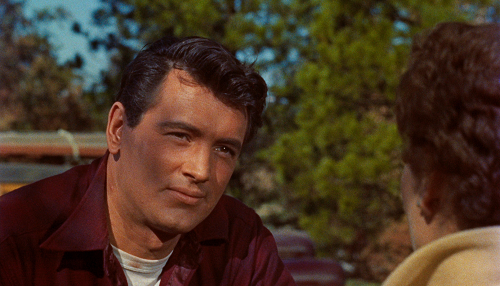
There’s an interesting flip of perspective and audience identification between Magnificent Obsession and All That Heaven Allows and the latter film is all the better for it. As central as Wyman’s character is to the story in Obsession, its narrative arc still follows Hudson learning to be a Good Man. The focus is on his desire, his confusion, his struggles - Wyman remains somewhat of a noble cypher. Even though she was nominated for an Oscar for her role,*** it’s impossible to say she plays a well-developed character. It's a film designed to engage a heterosexual female audience by focusing on the fantasy-object man - and it’s further out of whack for being about such an empty fantasy of a Perfect Fella. There’s no plausible entry-point for audience identification except as fantasy fulfillment.
By contrast, Heaven is almost exclusively about the frustrated desires of an aging housewife - its focus is extremely narrow (to its benefit.) This time, Hudson’s character plays the role of impossibly pure and good-hearted cypher. There is no explanation offered for why Hudson’s character becomes almost instantly devoted to Wyman’s widow instead of any of the young, sexy blondes who fawn over him throughout the film (these characters exist only to stoke the anxiety of Wyman’s perspective. A late film misunderstanding has her believe that she has missed her chance to marry Hudson and that he has instead paired up with one of these more natural matches.)
By exploring on an oft-overlooked archetype with a singular, unremitting focus, Heaven comes alive in a way that Obsession never does. But the magic trick of it is that it's every bit as artificial as Obsession. The modesty and truthfulness of Heaven isn’t necessarily generated by delicate lighting, precise production design or even its far superior dialog, but by its complete shift in perspective. This is, I think, the essential magic trick of all narrative art: this shift in perspective allows me, a man who could not be farther from Wyman’s character, to identify with her deeply, to get caught up in her story and accept it in me as my own.
Again, as a complete reversal of Magnificent Obsession, its narrative gestures are so small that nothing in the film could ever be considered contrived. The forces that tear apart the relationship are phantoms: a party that doesn’t go that badly, a brief argument between mother and son, an ambiguous duty to a deceased husband. Just as the moments that give their relationship its overwhelming power are almost nothing when described: a walk in the woods, a dinner party filled with laughter and music, the moment when Hudson helps Wyman remove her boots. The smallness of the film makes it huge; its force is found in its delicacy.
The beauty of Sirk’s lightning paired with the simplicity of his camerawork is not enough on its own to work this magic - the sincerity and honesty of its perspective is what makes it explode, the fineness of its aesthetic (every bit as present in Obsession) serving as an enhancement to a beauty that would be present in any case. I’m sure Board-Certified Sirkologists would disagree, but I think Heaven would still play, would still engage an audience, even if it were drab and mediocre in its aesthetic arrangements.
There is a crushing moment late in the film. Throughout the movie, Wyman’s character has expressed a disinterest in getting a television. Her friends joke that they understand that she wants to avoid the cliche of the widow with nothing left in her home but a box of distractions. But her kids and friends still push it on her. Of course, she’s taking long walks in a snow-blanketed forest and getting the ramrod from Rock Hudson fireside in his hand-built cabin, so t.v. is the last thing on her mind.
But her kids, humiliated by her affair with a working-class man 15 years her junior, and her friends, aghast at her impropriety, debase her with malice of gossip and shame her with remembrances of her dead husband. They ruin her love for no reason. It is impossible to understand their positions but their resistance has the logic and inevitability of death. She gives up Hudson for the sake of saving her life. She comes to her senses. She reassumes her role. And for Christmas: a massive new t.v. in her living room. Top of the line.
Sirk frames her reflection on the screen. She’s a ghost of herself. It is one of the loveliest and most heart-rending shots in cinema history.
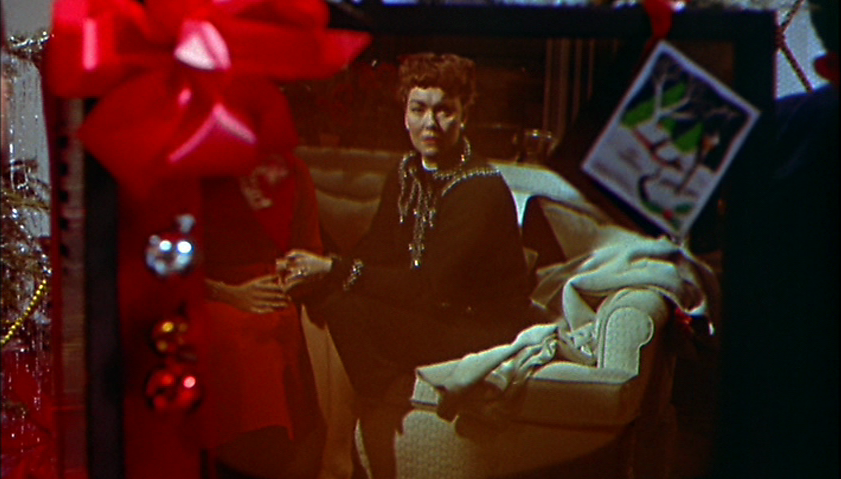
But it is an enhancement. The scene would play just as well without the beautiful image of Wyman’s ghost trapped in a box. I think credit for the film’s success goes in no small part to Peg Fenwick’s powerfully simple and direct script. Fenwick is a bit of a mystery - All That Heaven Allows is the only film she was ever credited with scripting and there’s almost no information out there on her. The total anonymity of this woman feels perfect for this film, the most delicate and forceful ode to refusing to die the unmourned death society casually demands of so many.
I understand why both Haynes and Fassbinder lifted from Heaven directly: Haynes with Far From Heaven and Fassbinder with Ali: Fear Eats the Soul. All that Heaven Allows is not a big film - even now, it’s a film with a power and meaning that I think is easy to overstate in some way. But it has an insight that feels both basic and like a total revelation: our roles (as mothers and wives and women of society) can be both entirely who we are and entirely at odds with who we are. This irony is so simple and so inescapable. It’s so obvious that it's overwhelming - or even this: Sirk’s film show us how something so obvious can be so elusive. It’s a radical simplicity: in its revelation you can see the whole history of sex-role-minded recusant cinema from Jeanne Dielman to Fat Girl to Carol.
Sure, it has its melodramatic aspects: a late-film tumble off a cliff by Hudson seems designed to make official the symmetry in the flip of perspective from Obsession, this time with Wyman nursing Hudson back to life from a near-fatal delirium instead of vice versa. And the less said the better about the goofy final shot of a deer peepin’ on them from outside the massive bay window of Hudson’s cabin. But these are minor complaints - it’s a film that I am tempted to call perfect. That doesn’t mean it’s one of my favorite movies or even that I have flipped entirely on Sirk (I watched Magnificent Obsession the same evening after all), only that its accomplishments are striking and to deny them would feel perverse and cruel - heartless.
Back to Fassbinder: “Sirk has made the tenderest films I know, they are the films of someone who loves people and doesn’t despise than as we do.” There’s real truth to that - and there’s something profoundly beautiful about discovering a film that shows me how to despise less. I agree with another part of Fassbinder’s review too, though, that Heaven elides its own unhappy ending - it's impossible to imagine how Wyman will fit seamlessly into her new role and that it'll be possible to leave her old self behind. But for now, I’m content to live in Sirk’s hope that not all loves will be crushed, that love can not only be a terroristic act but a revolutionary one.
Maybe that’s Sirk’s greatest trick of all: turning me and Fassbinder into goddamned sentimentalists.
~ FEBRUARY 7, 2017 ~
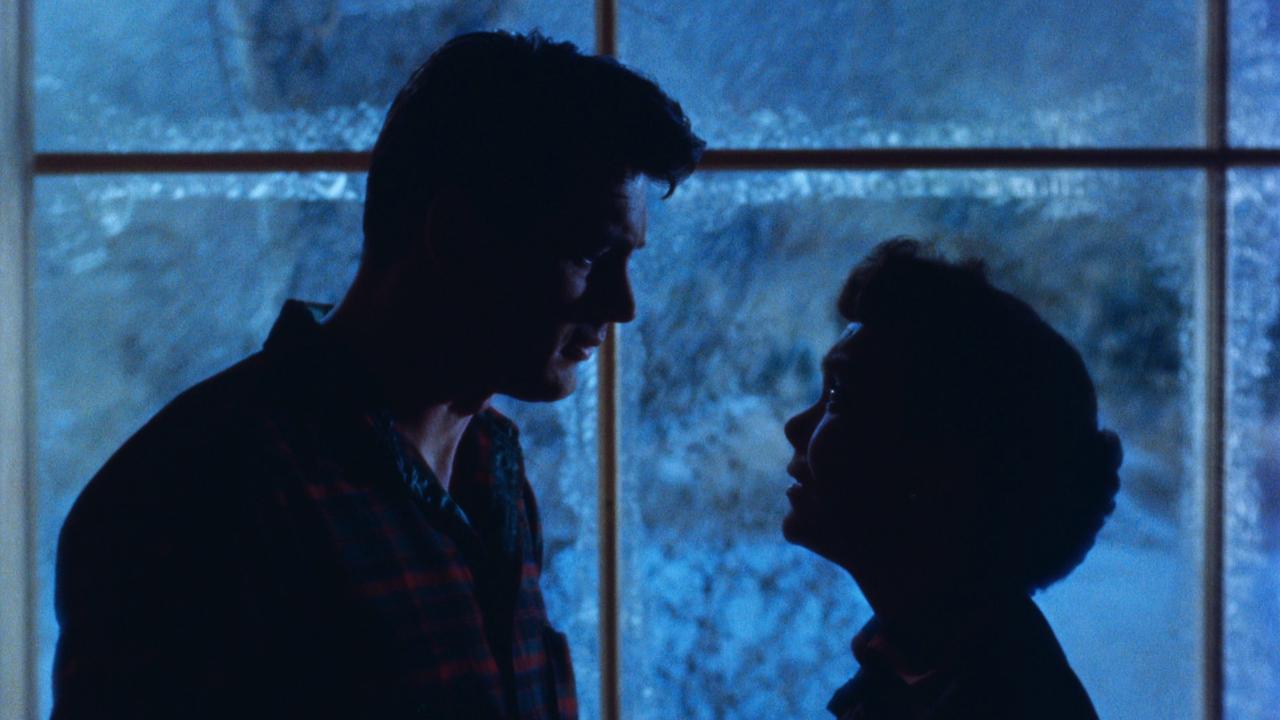
* It’s kinda weird that I have to explain this, but when Fassbinder uses the word “terrorism” he doesn’t mean to use it interchangeably with “evil” as it now is used. There’s a specificity to his meaning that might get lost on some readers now that the word has been degraded to only mean “a, like, really bad guy” (usually one with different political aims than whoever is using the word - e.g. Leftists hate using it to describe the Bastille Day attacker but make a point they seem to think is meaningful in insistently using it to describe the Quebec City mosque shooter, while Rightwing ideologues use it to describe any Muslim in the vicinity of law-breaking but never CIA-sponsored death squads in Central America.) Fassbinder applies the word in the context of violent, destructive, decentralized political action of indeterminate value - aggressive political gestures targeting emotions more than policy or even concrete military goals. He’s open to the possibility that one could be a righteous or at least sympathetic terrorist (see Mother Kusters - or watch his definitive statement on the subject, The Third Generation.) I also feel like in the current bizarre political climate I have to avow that I don’t agree with that idea that terrorists are anyone other than whom I believe to be most politically abhorrent. Consider it avowed.
** Do I just hate Robert Stack? Is that what’s going on here?
*** It's nominations like this that make it impossible for me to give a shit about the Oscars - if you look at the 1954 nominess, the list is completely irritating. Grace Kelly won for Country Girl! The Supporting Actress nominees are even more absurd.










